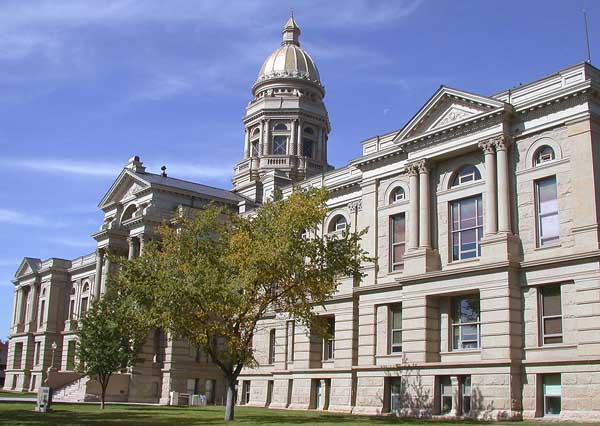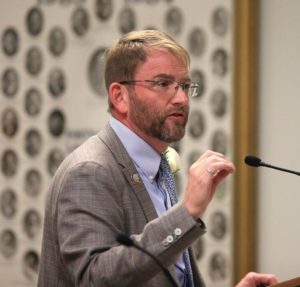
Chris Rothfuss is a Wyoming senator for district 9 and current Wyoming Senate minority leader. He is also a Ph.D. chemical engineer. After graduating from the University of Washington (UW), Rothfuss became a AAAS policy fellow in the U.S. Department of State, developing foreign policy for areas such as nanotechnology and mitigation of space debris. Family history brought Rothfuss back to Wyoming, where he is not only serving his third term in the Wyoming state legislature, but also teaching in the University of Wyoming’s International Studies Department and patenting a suite of inventions. ESAL interviewed Rothfuss about how his scientific background informs his work as a senator, and how it has shaped the state’s response to the COVID-19 pandemic.
DR: What is it like to be a scientist and state senator during the pandemic response?
Rothfuss: I am bringing value by building bridges between U. Wyoming and Governor Gordon’s office to make sure that he has access to the university knowledge base. My position gives me lots of opportunity to interact with the governor and his team. I am trying to ensure that well-informed researchers are part of the decision-making process.
DR: Which parts of the University are you connecting with?
Rothfuss: A whole range, from economics to the vet lab to zoology, psychology, molecular biology, and microbiology. The university was eager to engage with the Governor’s office but did not have a vehicle established.

Sen. Chris Rothfuss. Credit: Jacob Byk/Wyoming Tribune Eagle.
DR: What are the goals in the bridge with the University?
Rothfuss: The earliest concern was to understand how to get triage solutions in place instead of getting bogged down in bureaucracy. These included testing equipment and masks and the myriad of other medical needs. I was advocating during the early geometric growth phase of COVID-19 in Wyoming that we not just plan for today. We needed to be prepared for the ten-fold and hundred-fold increases in virus cases, to be future-focused with a plan and resources in place.
DR: How did your background help you assume a future-facing role?
Rothfuss: As a scientist, I have a native understanding of how things can progress exponentially. As an engineer, I am used to crafting contingency plans to put resources in place for the future. Wyoming has not been as successful as I would have liked in scaling up. Then again, there are no shortage of issues to deal with!
DR: How was your approach received by the Governor and other politicians?
Rothfuss: My great relationship with Gordon helped get things moving. A frustrating aspect, though, is the reticence of people to accept that there is even a problem. One reason why Wyoming did not shut down more tightly was concern about a backlash of protests. While folks have been shouting to open things back up, information that is not scientifically credible spreads around, e.g. about how the pandemic is no worse than the flu and other nonsense.
DR: Given the shut-down, how do you and other legislators carry on your public-facing role?
Rothfuss: We just did our first official legislative committee meeting by Zoom. It went well, but with a glaring weakness of the public participation aspect. The state of Wyoming is BIG on public comment and participation. All meetings are open to public testimony. We are searching for a suitable way to replicate that process on Zoom.
DR: Can’t more people participate on Zoom?
Rothfuss: That’s part of the problem. A face-to-face public meeting self-selects a reasonable number of people with a high enough desire to engage, typically 5-6. In Zoom, how do you filter out people that have not just stumbled on the topic, but rather bring their interest, thoughts, and knowledge to the conversation? We want to make sure that everyone has a chance to participate, while continuing to rely on the expertise from the public that complements what we have in the Senate. We are a citizen’s legislature.
DR: I see that your background includes both international studies and hard sciences. How did those become related for you?
Rothfuss: Science was my passion as a kid, and I loved science and mathematics in high school. I got exposed to policy on the high school debate team. I continued to the debate team at the University of Washington. It is an incredible, nationally competitive team that immersed me in foreign policy.
At first I majored in engineering. When I switched to international studies, I found wonderful synergy with my research for debate topics. I gained a broad view of the world through a policy lens and became interested in climate change, sustainable development, and other scientifically intensive policy areas.
DR: And you went on to get advanced science degrees?
Rothfuss: Yes, I realized that I needed deep science knowledge to be effective in policy. I went to talk to the UW Chemical Engineering department, where my future wife was studying, about how to get a strong scientific foundation. I met with the then-department-head, Dr. Chang-Yul Cha. He agreed about the importance of bringing science into policy and challenged me to make it through the first semester of course requirements, and then he’d fund me for a graduate degree in his research lab.
DR: I guess you passed the test!
Rothfuss: I did! And I found that the thermodynamics and energetics aspects of chemical engineering are relevant for climate change issues. Also, Dr. Cha had been the vice president for Occidental Petroleum. After graduate school, he brought me on for consulting work on enhanced oil recovery. For almost 15 years, I bounced around the world for up to a month at a time doing reservoir analyses. It gave me a valuable perspective on global energy issues that would be useful later in my career.
DR: What got you back to Wyoming running for office?
Rothfuss: My wife, who became a professor at the University of Wyoming, and my family, as we started having children. I first ran for U.S. Senate. Inspired by the excitement around the 2008 presidential election, I decided to run against Republican Senator Mike Enzi.
DR: Did you expect to win, as a Democrat running for office in the reddest state in the nation?
Rothfuss: I didn’t! I had no misconceptions about winning, given the data. But I was honoring the importance of the election process and ensuring that appropriate policies were at least put on the table. I saw the impending problems around the world – a recession coming on, banking sector and mortgage crisis, an unstable Middle East – and was fired up to get involved, fresh off my D.C. experience.
DR: What gave you the confidence to try again?
Rothfuss: I had developed a good network of support, met everyone in politics in Wyoming, made some friends, and gotten to know the state issues better. They say that “Wyoming is a small town with long roads.” I felt that the community was telling me to stay involved, despite my predictable loss to Mike Enzi. He and I went on to become good friends.
DR: What limits politicians from making decisions based on scientific evidence?
Rothfuss: Even when other legislators agree with me on an issue, their constituents may not trust the data or may find the evidence-based choice unpalatable. What I understand now is that if a policy-maker offers to build a perpetual motion machine for a district – and the economic advisor says that it’s good for jobs while the science advisor says it’s physically impossible - the district may decide to build it!
DR: Do you have any advice to other scientists and engineers running for office?
Rothfuss:
I’d like to see more scientists and engineers coming to the table to shape their communities and the world.
Find more articles about how engineers and scientists are contributing to the COVID-19 response here. ESAL has also compiled a list of many other ways you can help your community respond to COVID-19. Have additional ideas? Please send them to info@esal.us.
Do you have a story to tell about your own local engagement or of someone you know? Please submit your idea here , and we will help you develop and share your story for our series.